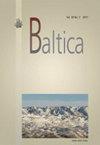Methodology for assessing the geoecological state of landscape-lake systems and their cartographic modelling (case study of Lake Bile, Rivne Nature Reserve, Ukraine)
IF 0.6
4区 地球科学
Q4 GEOLOGY
引用次数: 1
Abstract
The reassessment of the geoecological state of landscape-lake systems (LLS) and their cartographic modelling employing the methodology of landscape limnology has been conducted. The purpose of this study was to characterize the essence of the applied methodology and to evaluate the geoecological state of LLS based on the case study of the Lake Bile basin, Rivne Natural Reserve, Ukraine and to develop cartographic models of the aquatic complex and its catchment as an information basis for the integrated management of water and land resources of LLS and sustainable nature management. The results obtained from the field instrumental research conducted within the Bile Lake basin were used for substantiating the use of laboratory methods and QGIS software, for producing the catchment land use map and assessing the geoecological state of the basin, for developing the bathymetric model of the reservoir and determining hydrological and hydrochemical parameters, for analyzing the lithological composition of the rocks of the exploratory well, elucidation of the genesis of the reservoir, for the first-time production of landscape maps of the natural-aquatic complex and water catchment, and for establishing landscape-metric characteristics of the lake-basin system. The degree of the anthropogenic load on landscape complexes in the 100-meter zone around the lake was assessed. The performed research showed that the conceptual foundations of landscape limnology, as a modern transdisciplinary scientific direction, are an innovative and effective tool for assessing the geoecological state of LLS, and scientifically supporting the integrated management of its water resources and sustainable nature management.景观-湖泊系统地质生态状态评估方法及其制图建模(以乌克兰河河自然保护区比勒湖为例)
应用景观湖沼学方法对景观湖系统的地质生态状态进行了重新评价,并对其制图建模进行了研究。本研究的目的是描述应用方法的本质,并基于乌克兰河自然保护区比勒湖流域的案例研究来评估LLS的地质生态状态,并开发水生综合体及其集水区的制图模型,作为LLS水陆资源综合管理和可持续自然管理的信息基础。在比勒湖流域进行的现场仪器研究结果用于验证实验室方法和QGIS软件的使用,用于制作集水区土地利用图并评估盆地的地质生态状态,用于开发水库的水深模型并确定水文和水化学参数,用于分析探井岩石的岩性组成。阐明水库的成因,首次制作自然-水生综合体和集水区的景观图,并建立湖盆系统的景观度量特征。评价了环湖100 m范围内景观综合体的人为负荷程度。研究结果表明,景观湖沼学概念基础作为一门现代跨学科的科学方向,是评价湖泊地质生态状况的创新有效工具,为湖泊水资源综合管理和自然可持续管理提供科学支撑。
本文章由计算机程序翻译,如有差异,请以英文原文为准。
求助全文
约1分钟内获得全文
求助全文
来源期刊

Baltica
地学-地质学
CiteScore
1.30
自引率
14.30%
发文量
6
审稿时长
>12 weeks
期刊介绍:
BALTICA is an international periodical journal on Earth sciences devoted to the Baltic countries region and the Baltic Sea problems. This edition as a Yearbook is established in 1961 by initiative of Academician Vytautas Gudelis. Since 1993, an Editor-in-Chief of the journal became Academician Algimantas Grigelis. BALTICA is published biannually (in June and December) in cooperation with geoscientists of the circum-Baltic States.
BALTICA is publishing original peer-reviewed papers of international interests on various Earth sciences issues. The particular emphasis is given to Quaternary geology, climate changes and development of ecosystems, palaeogeography, environmental geology, as well as stratigraphy, tectonics, sedimentology and surface processes with relevance to the geological history of the Baltic Sea and land areas. Journal emphasizes modern techniques, methodology and standards. The journal structure comprises original articles, short reviews, information, bibliography.
 求助内容:
求助内容: 应助结果提醒方式:
应助结果提醒方式:


